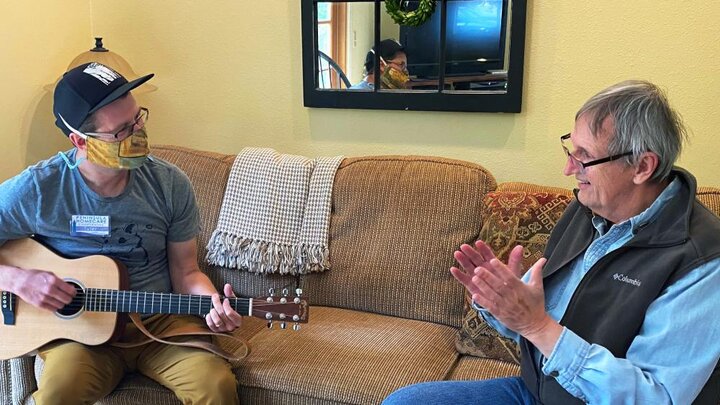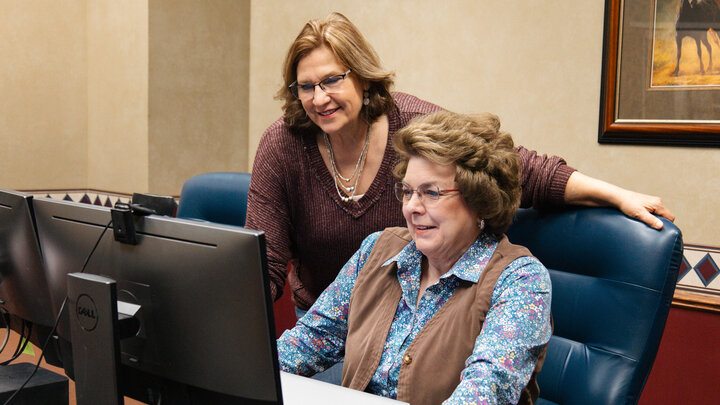The University of Nebraska–Lincoln’s Nebraska Cooperative Development Center is collaborating with the Northwest Cooperative Development Center, based in Olympia, Wash., to create an online academy that walks rural communities through creating homecare co-ops in their communities. The six-session academy begins May 4 and runs weekly through June 8. Sessions will be available on Zoom for free.
“The reason we’re partnered with Northwest Cooperative Development Center,” said Cindy Houlden, the NCDC cooperative development specialist running the academy, “is they have formed five homecare cooperatives. The oldest one was founded in 2009. The most recent one in 2021.”
The academy will be the first of its kind in Nebraska. Cooperative law varies state to state, so while the NWCDC is providing the know-how, the legal questions, licensing requirements, caregiver rules, logistical guidance and other details the sessions cover will all be specific to Nebraska’s regulations.
“Unlike grocery co-ops, where members of the community come together to form the store, this cooperative is made up of employees,” said Houlden. “It’s owned democratically. They set the wages, benefits and policies. They determine how the business is managed. And specifically with a homecare cooperative, they decide the quality of care, how care is delivered, the type of client they want to serve, the type of care they want to provide, how they want to be reimbursed, their rates—it’s all determined by the employees.”
There’s a lot to consider when creating a homecare co-op, said Houlden, but the academy will cover all the red tape and how to manage it successfully.
The percent of American citizens 90 years and older has doubled since 1980. With the number of senior citizens expected to reach 73 million by 2030 (outnumbering children under five for the first time in history), homecare co-ops are increasingly becoming a viable career option and a necessary part of rural communities.
The NCDC has worked with cooperative grocery stores in communities for years, but Houlden said the idea for a homecare worker cooperative came to them serendipitously. A woman who once worked for a homecare co-op in Washington moved to Lincoln and contacted Houlden’s office, asking if they had information on similar businesses in Nebraska. When the answer was no, the woman connected Houlden with Deborah Craig, a cooperative development specialist with NWCDC.
“We started conversations last summer about, ‘How do we bring this model into Nebraska? What do we do? How do we make this happen?’” said Houlden. “Long story short, the initial contact moved to Maryland, however, we continued the conversations with [Craig], applied for a socially disadvantaged populations grant through USDA, got the grant, and now we’re creating this academy.”
The topics and goals of each of the six academy sessions are outlined below:
Session 1, May 4: Making Decisions—Democracy in the Workplace
Goals: Participants review and practice different decision-making models, participants understand the roles of the board/manager/members in co-op governance.
Session 2, May 11: Laying the Foundation—Business Basics
Goals: Participants create a basic business plan, identify the skills and experience needed to run the business, and take inventory of the group’s skills.
Session 3, May 18: Show Me the Money—Understanding Your Co-op Finances
Goals: Participants learn how to read financial statements, understand basic financial terms and systems used, and understand how financial decisions are made in their co-op.
Session 4, May 25: Telling Your Story—Marketing Your Co-op
Goals: Participants will develop a one-page marketing plan, and will learn how to market their co-op and train other co-op members to do the same.
Session 5, June 1: People Management—Inspiration and Accountability
Goals: Participants will identity and understand the many accountability systems that will run through the co-op, practice “difficult conversations” and develop active listening skills.
Session 6, June 8: Member Engagement—Bringing Democracy Alive in the Workplace
Goals: Participants will understand the importance of making democracy a priority in their co-op and have a plan to implement various systems for democratic participation. This session will facilitate discussion on building systems for meaningful member participation and power sharing within the co-op. Presentation will include testimony from Washington homecare co-op members on how their co-op brings democracy alive in the workplace.
You can register for the academy here.
After registration, an automated email will be sent to you containing information about joining the sessions via Zoom.
The Nebraska Cooperative Development Center is housed in the Department of Agricultural Economics at the University of Nebraska–Lincoln. NCDC programs abide with the nondiscrimination policies of the University of Nebraska–Lincoln and the United States Department of Agriculture. NCDC is funded in part by the USDA RCDG Grant Program and a USDA SDGG Grant Program. For more information, visit ncdc.unl.edu/.




